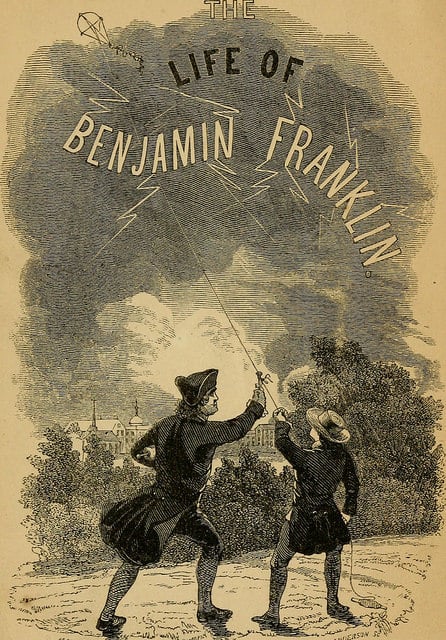Image from Page 6 of The Life of Benjamin Franklin
Lesson Study: First Draft
Content: Students will be given a quote by a famous historical figure, or a quote about an important moment in history. Preferably, these quotes would be ones that are not typically associated with the speaker or moment, so that students will have to think harder about the context the quote could have been given in. For example:
“The People happen to love me. Perhaps that’s my fault.” -Benjamin Franklin
Process: The quote (with speaker and the approximate date when it was said or written) would be put up on the projector for the class to read. Each student will then be given a few minutes to think about and write down ideas about what they think the context of the quote is and who the speaker is. This could be long bullet points or a short paragraph, whatever form they decide their work should take. What was the speaker really trying to say? What does it say about the time it was said during? If they know who the speaker was, they can write down what background knowledge they possess about this person. If they do not, they can speculate who they think the speaker was. Students will then share their ideas in pairs or small groups and will come up with a consensus for their group, which will be written down and given to me. I will then read out these ideas, conduct a short discussion, and then give a lecture on what the quote was really about.
Product: This is a lesson to be repeated, and by the end of the mini-unit, the students should each have a collection of reflections written down that they would be able to turn in.
Evaluation: With these reflections, I would like to stress to the students that there are no wrong answers. It does not matter if they were completely wrong about their theory, as long as they are able to clearly explain why they thought the way that they did. They should also be able to reflect on how their thinking changed after they learned about the true context of the quote. Ultimately, the mini-unit would be ended by having each students find a quote of their own, and to repeat the exercise. Another possible final assessment option would be to have each student make up a quote that a historical figure might have said, or about an event. They would then exchange quotes with another student, and would essentially teach a mini-lesson to their classmate.
What kinds of thinking will students need to do to participate in the lesson? Ideally, over the course of the mini-unit, students will have to employ every level of thinking according to Bloom. First, they must remember and understand the history behind each quote to some degree. They will then take what background knowledge they have, and apply that to their understanding of the quote, which they will then analyze and evaluate what the true meaning of it is. With their final assessment, they will have to apply everything they have learned from the previous lessons in order to create a product of their own for a fellow student to evaluate.
To what extent do students have options or choices regarding these lesson components? Students can express their individuality through their own interpretations. Each lesson will start with them being given the chance to think whatever they wish, without any prompting from me. They will also be given choices when the time comes for them to create their own mini-lesson.
Reflection
I went about designing my lesson study by starting with the Benjamin Franklin quote above. I came across it in a reading for a history class, and decided that I needed to come up with a way to implement it into my future teaching. That got me thinking about other historical quotes that I enjoy for their wildness. I decided to structure my lesson study around this idea, and decided to focus it upon context and perspective.
Accomplishing the peer reviews was easy. The hardest part for me was not knowing how much feedback I was supposed to contribute. As a college student, and a soon-to-be teacher, I’d like to think that I am good at taking and giving constructive criticism. Going into the peer review sessions, we knew that we were supposed to be helping each other, and that it was nothing personal. A big part of teaching is being able to realize that what you’re doing isn’t working, and being able to set aside your pride and admit that you need to make changes. Accordingly, a class of future teachers should have no problem with constructive criticism. This is not going to be something I’ll have the chance to teach in this student teaching placement, but I hope I will be able to implement it in my advanced placement.

